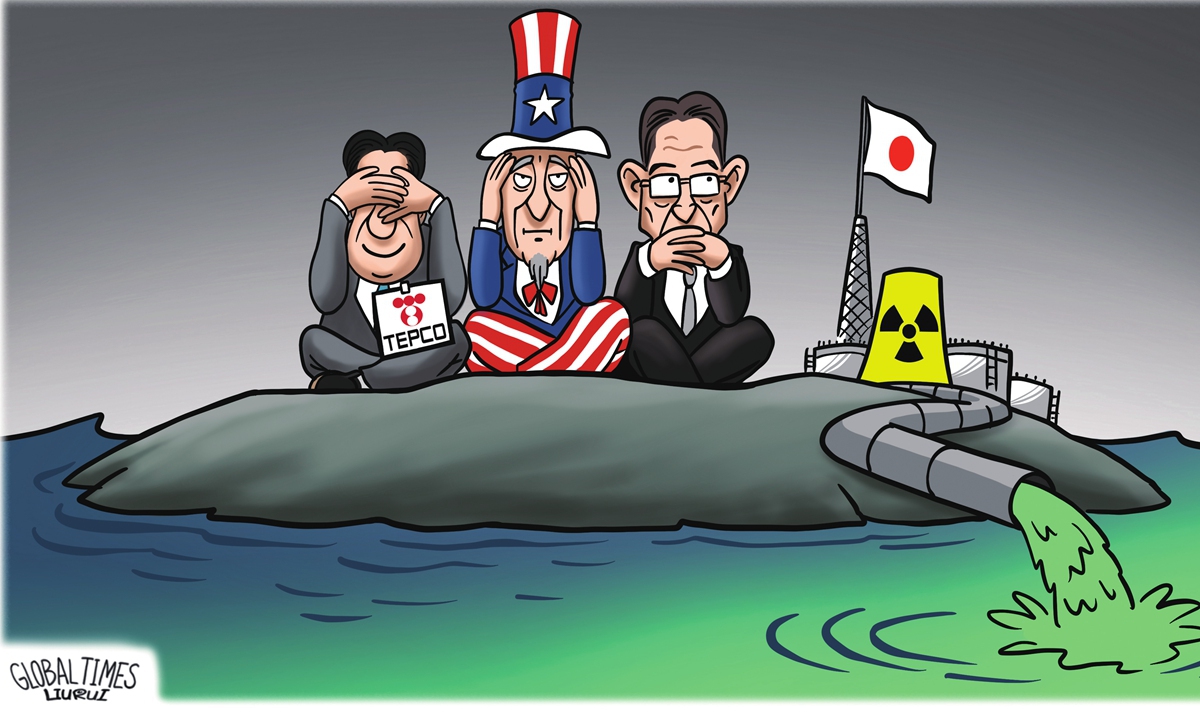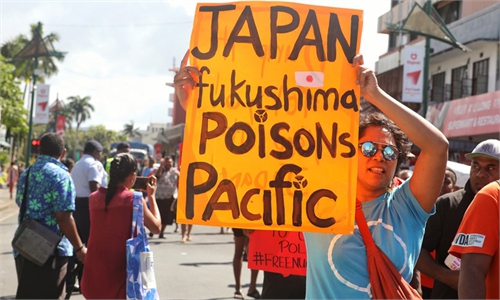
Illustration: Liu Rui/GT
On August 24, Japan began the process of dumping Fukushima's nuclear-contaminated wastewater into the ocean, resulting in the contamination of the Pacific Ocean. That day has not only opened the darkest moment for marine life near Japan but also reflects a disregard for rules, constraints, and constructive actions within the international community.Japan's "Thick Black Theory" is characterized by three shameful traits, which have been displayed through the dumping of nuclear-contaminated wastewater, greatly compromising the goodwill and morality of the international community.
First, Japan thinks it can justify its arbitrary actions by cultivating relationships with the hegemonic powers. In recent years, Japan has taken unprecedented steps: It has relied on the military, diplomatic and economic power of the US, aligning itself closely with the US Indo-Pacific strategy and willingly acted as a "hatchet man" for the US in containing China. A Japanese politician once arrogantly claimed, "A Taiwan emergency is a Japanese emergency." Based on this logic, Japan believes with "confidence" that any incident in Japan is equivalent to an incident in the US and that regardless of Japan's violations of international morality or harm to regional public interests, the US will always support Japan.
Second, Japan believes that international mechanisms can do nothing if it reduces its sense of responsibility. Japan has heavily publicized the assessment report on the safety of nuclear-contaminated water released by the International Atomic Energy Agency in July. However, it deliberately conceals the fact that the report is only a technical assistance and advisory evaluation and does not have the power of international law. Meanwhile, Japan remains silent on the facts related to international law.
For instance, both Japan and China are important members of the "Convention on Early Notification of a Nuclear Accident," and Article 6 of the Convention stipulates that "A State Party providing information pursuant to sub-paragraph (b) of Article 2 shall, as far as is reasonably practicable, respond promptly to a request for further information or consultations sought by an affected State Party with a view to minimizing the radiological consequences in that State." However, Japan's unilateral actions clearly show a lack of responsibility in consulting with neighboring countries.
Third, Japan considers that as long as one ignores one's sense of guilt, opposition is irrelevant. Faced with criticism and questioning from the public and scholars of Japan, South Korea, the Philippines, Indonesia, South Africa, Peru and China, and experts from around the world, Japan and Tokyo Electric Power Company repeatedly express only a sense of "helplessness" and the conclusion that the water is "harmless." They refuse to directly address reasonable concerns. These selfish schemes are not only pushing the Japanese people into the abyss but also breaking the sense of security and belonging that the international community has painstakingly built over the years.
However, many politicians and media outlets in the US and the West not only turn a blind eye, but also praise and even "speak up for" the Japanese side.
The immoral and illegal actions of Japan reflect those of other "like-minded" countries. The US has expressed "satisfaction" with Japan's wastewater discharge plan, and certain American and European media outlets claimed that China's criticism of Japan is hypocritical and that creating the Fukushima scare is in China's interest. These comments reveal how they distort a serious scientific issue concerning the well-being of the international community into a political issue related to international relations. The motives behind these remarks are thought-provoking.
In face of marine nuclear pollution, the concept of a community with a shared future for mankind is not only a vision but also a reality.
As a responsible major country, China urges the international community to urge the Japanese government to correct its mistake, immediately stop dumping the nuclear-contaminated water, communicate honestly with relevant countries and stakeholders, and handle nuclear pollution in a responsible manner in order to avoid unpredictable destruction and harm to the global marine environment and the well-being of people worldwide. It remains to be seen whether Japan can turn around or if it will persist in carrying out these audacious actions.
The author is an associate researcher with the Institute of American Studies of the Chinese Academy of Social Sciences. opinion@globaltimes.com.cn

